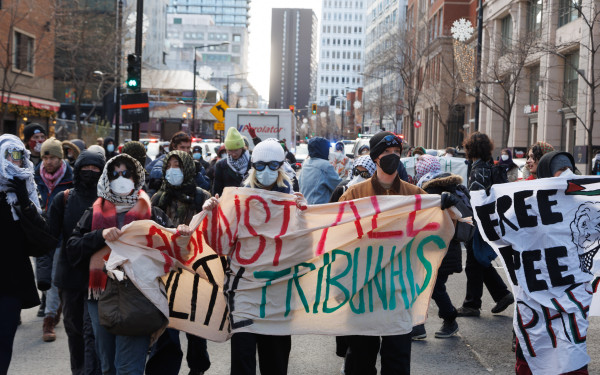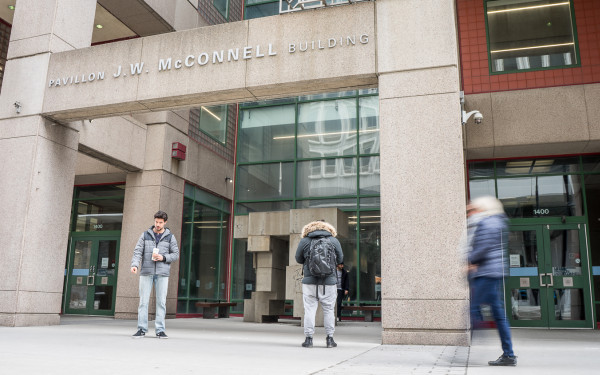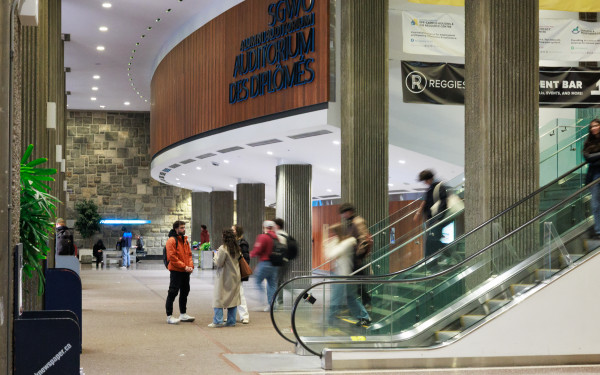The legacy left behind by the 1969 Computer Riot
Remembering Concordia’s Computer Riot 52 years later, and its place in today’s academic setting. File Photo Concordia archives
Decolonizing Concordia starts with its past
In response to a teacher’s racism and an institution tone-deaf to complaints, hundreds of students once occupied the ninth floor of what is now Concordia University’s Henry F. Hall Building. This led to $2 million worth of damages and one of the largest student activism occupations in Canadian history.
It started when six Caribbean students received unequal treatment from their biology teacher Perry Anderson, who would have deliberately given the medical school hopefuls low or failing grades in the spring of 1968.
Convinced their professor was racist, the students attempted to confirm their suspicions by submitting two identical assignments for grading—the white student got a 90 per cent, and the Black student a 68.
After complaining to the Dean of Students, the university created a hearing committee to investigate the accusation. Clashes continued between the administration and the student body, causing sit-ins and peaceful demonstrations against anti-Black racism at the school to increase.
A new committee met on Jan. 29, but students did not approve of their representatives which led to hundreds of students walking out in protest. Around 200 of them occupied the Computer Centre of the Hall Building’s ninth floor, where the school’s main computer was located.
The occupation spread and lasted 14 days before a fire was lit on Feb. 11. This led to an estimated $2 million worth of damages, and documents and computer parts were thrown out of the windows onto De Maisonneuve Blvd.—which is why the windows are now bolted shut.
Ninety-seven people were arrested after police and riot squad officers rushed into the room. The death of 18-year-old Coralee Hutchison at the scene was linked to police violence.
Today, many students maintain that what sparked the Sir George Williams University protest in the late ‘60s is not a thing of the past.
“Everyone likes to remember the good moments in history, but downplay the bad ones,” said General Coordinator of the Concordia Student Union Isaiah Joyner. “To the untrained eye, people believe there's no racism here in Canada. And then when it happens, are quick to say, ‘Well it's been addressed and we're no longer like that.’”
The ‘69 riots did lead to consultations about race, pushed the university to implement an Ombuds office and a code of conduct.
“It's not perfect, but we're making steps in the right directions,” said Joyner.
Last February, Concordia launched the Black Perspectives Initiative to offer Concordia’s Black community funding, mentorship, research opportunities and programming in support of Black perspectives.
Concordia’s Task Force on Anti-Black Racism is also making prevalent changes in terms of representation, but these initiatives are long overdue.
Today’s climate has significantly progressed in how people understand and recognize the importance of racial equality. Yet, the mechanisms in place for getting justice are not always simple, according to Joyner.
He explains that students do not necessarily want to take action because of the “cumbersome processes.”
“I’m thankful that the people did stand up and fight for change, setting the path for people like myself and members of my community to be able to hold leading positions and thrive in this academic environment.” — Isaiah Joyner
“When you feel like you've been discriminated against as a student, you'll weigh out the options—‘Should I still go with this process or should I just tough it out?’” he said.
Complaints are handled case-by-case and it is the evidence that determines the type of results to expect, said Joyner.
“Before the incident with George Floyd, a lot of students would choose to tough it out because they think, ‘It's this one class. It's one teacher,’” he said. “But again, any racism is bad and it's not just a Concordia thing. It's an academia thing.”
Joyner adds that the debate around whether the n-word can be used under the pretext of academic freedom alone shows there is still work that needs to be done to decolonize academic settings.
Film studies Professor Catherine Russell used the n-word on two occasions while presenting a book in a class in the fall of 2019—what students described as “unacceptable” and “uncomfortable.”
Read more: Tenured film studies professor accused of racism
Russell issued a written apology, but some students filed a complaint with the university and started a petition condemning the professor’s actions.
“There must be a concerted effort to refuse any and all framing of Professor Russell's infraction as an isolated, one-off incident, for it is precisely through such masking that systemic racism operates,” read the petition.
“People should be able to fully teach a class without having to put the burden on students and their comfort or turning it into class discussions,” said Joyner.
To highlight Concordia’s dark past and unfinished legacies, the Protests and Pedagogy Collective addressed the school’s institutional responsibility for reparative justice in a statement titled “Still Demanding Justice,” released last summer.
“A starting point for Concordia would be an institutional apology for calling the police on Black students in 1969, but also attention to the further demands the students made in 1969 including their call for Black studies,” read the statement.
The heavily-pushed demand for a Black studies program dates back five decades and has again been rejected by the university in 2018. In a statement, Concordia claimed it lacked trained Black faculty to teach in the program.
Anti-racism initiatives and activism for racial equality have seen a significant reckoning since last summer. After the murders of Black people at the hands of police officers caused an international uproar, anti-racism protests have been globally widespread, and the words ‘Black Lives Matter’ painted over cities across the world.
A statement urging Concordia to take concrete action on anti-racist pedagogy circulated last June, and garnered nearly 7,000 signatures.
“Ending anti-Black racism requires more than ending police violence. It requires broad-based systemic and institutional change across all sectors of society, including education,” read the Concordia statement on Black Lives.
Joyner says his position within the CSU embodies the legacy left behind by these events.
“I'm thankful that the people did stand up and fight for change, setting the path for people like myself and members of my community to be able to hold leading positions and thrive in this academic environment,” he said.
“If moments like these didn't happen, chances are that we might've not even been given these opportunities,” he added.
Joyner thinks not enough students know about this pivotal moment of their university’s history.
“I'm just I'm happy that we don't have to take such drastic actions anymore to get the attention [on racism],” he said, “Hopefully, there'll be a day where events like this won't the topic of discussion because it will just be as simple as fixing an AC unit.”




